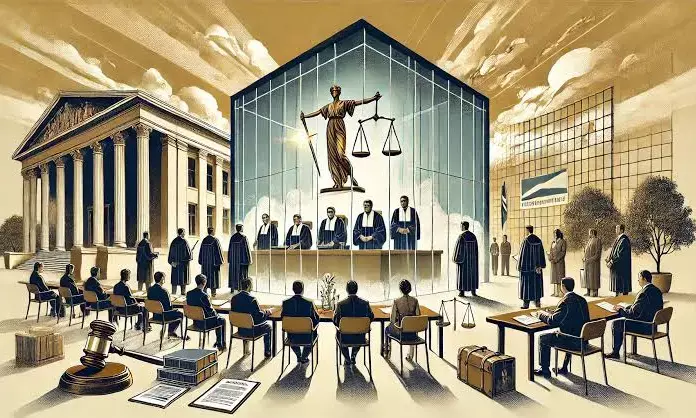Transparency in Judicial Appointments Essential: Flaws in Collegium System Demand Reforms
The collegium system for judicial appointments has faced criticism for lack of transparency. Experts advocate for reforms to ensure accountability and public trust.;

An independent judiciary is the cornerstone of a thriving democracy, but independence does not imply a completely opaque and self-governing mechanism. In a democratic country like India, where transparency, accountability, and public participation are foundational values, the appointment of judges must follow a balanced, constitutional, and open process. The longstanding questions raised over the collegium system can no longer be brushed aside in the national interest.
Tensions between the judiciary and the executive seem to be escalating once again. This conflict, however, is not new. It began decades ago with disagreements between the judiciary and the other two pillars of Indian democracy — the legislature and the executive — particularly over the issue of appointments to High Courts and the Supreme Court. While the Indian Constitution ensures the independence and accountability of all three pillars, the question arises when the judiciary begins to make appointments outside the constitutional provisions: Is this practice just and constitutionally sound? Can such a system of ‘self-appointment’ adhere to the principles of transparency and accountability?
Currently, judges in the Supreme Court and High Courts are appointed through the collegium system — a mechanism not explicitly mentioned in the Constitution. Rather, it evolved from a series of Supreme Court judgments known as the “Three Judges Cases.” Through these cases, the apex court ruled that judicial appointments must be made via a collegium comprising the Chief Justice of India and the four most senior judges of the Supreme Court. The collegium’s recommendations for appointments and transfers are deemed final, even though Article 124 of the Constitution originally provided that the President appoint judges after consultation with the Chief Justice and other senior judges. The final authority for such appointments was intended to lie with the President of India.
While the collegium system was introduced to safeguard judicial independence, it has drawn consistent criticism — primarily for its lack of transparency. Collegium recommendations are often made in secrecy, with no clear criteria disclosed to the public. This has raised questions regarding transparency and accountability. Furthermore, neither the public nor Parliament has any mechanism to question or review these decisions, thereby weakening democratic oversight.
The collegium has also faced allegations of appointments based on personal recommendations, familiarity, or regional bias. What is striking is the absence of any formal rebuttal or investigation into such accusations, giving rise to suspicion and doubt.
The framers of the Constitution envisioned a system of checks and balances in judicial appointments, where the executive, judiciary, and the President would play complementary roles. However, the collegium has shifted this balance heavily in favor of the judiciary, which goes against the basic tenets of democracy. In 2014, Parliament unanimously passed the National Judicial Appointments Commission (NJAC) Act, aiming to bring transparency and accountability to judicial appointments. Yet in 2015, the Supreme Court struck down the Act, declaring it unconstitutional, reasoning that NJAC might compromise judicial independence.
No law is perfect. Amendments and reforms are essential in a living democracy. The NJAC, while imperfect, was a step in the direction of transparency and public participation. The primary reason cited for creating the collegium was the rising political interference in judicial appointments, which could threaten the judiciary’s independence. But if judges themselves, through the collegium, begin appointing unsuitable candidates, does this not undermine the judiciary from within?
This concern becomes particularly pressing when the public — the supreme authority in a democracy — is excluded from any role in appointments, a role that the Constitution had originally envisioned for its elected representatives. In recent times, the credibility of the judiciary has taken a serious hit. The most glaring example is the discovery of crores of rupees from a High Court judge’s residence. Instead of prompt and decisive action, the matter appears to have been pushed under the rug.
In the case of Delhi High Court judge Yashwant Singh, the nation has a right to know where the fifty crores came from, and why no open investigation is being conducted. Are judges above the law? Shouldn’t they too be subject to the same impartial investigations as any citizen? Who decided that judges are exempt from scrutiny?
Judicial stalwarts who swiftly order CBI investigations into other cases have remained mysteriously silent in this instance. What law made by Parliament allows for "internal inquiries" in such serious criminal matters? This silence and evasion only serve to erode public trust and push the country further into the depths of corruption. If not addressed, this may strip the judiciary of its moral authority to act against corruption in the future.
Another crucial question arises: if the elected government can make decisions on national security, nuclear policy, war or peace, trade, and economic development, then how can it be deemed incapable of fairly appointing a few judges? Why do a select few judges insist on keeping the power of appointment solely within their hands? This remains baffling for the common citizen.
The only sustainable solution to this ongoing conflict is to reform the judicial appointment process, making it more transparent, accountable, and balanced. The collegium system must be abolished, and all stakeholders — the government and the judiciary — must come together with open minds to establish a constitutionally sound mechanism. Such a system must ensure that only capable and honest individuals are elevated to high judicial offices. This is not an impossible task.
Judicial independence is essential, but it should not be equated with a closed and secretive system. In a democracy like India, where transparency and public accountability are sacred principles, judicial appointments must reflect these values. The time has come to address — not suppress — the valid concerns raised about the collegium system, in the best interest of the nation.
(Vijay Shankar Pandey is a former Secretary to the Government of India)

